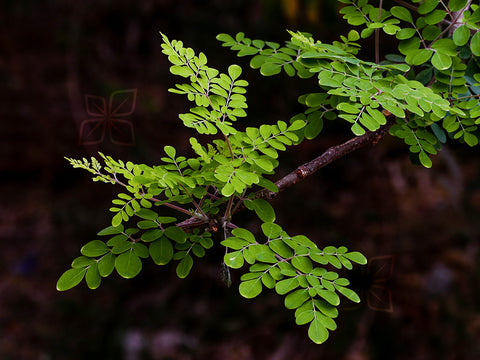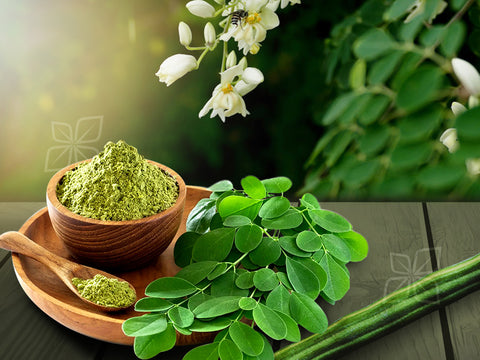Super Green Wonders: Moringa Health Benefits, Nutrition, and Uses
Super Green Wonders: Moringa Health Benefits, Nutrition, and Uses
Moringa, often called the "Miracle Tree", has been treasured for centuries across cultures for its incredible nutritional value and versatile uses. Packed with nutrients, antioxidants, and anti-inflammatory properties, this super green continues to shine as a staple for healthy living.
Let’s explore the health benefits, culinary uses, and unique qualities that make moringa a must-have for your kitchen and wellness routine.

What is Moringa?
Native to parts of India, Africa, and Asia, Moringa oleifera is a fast-growing tree valued for its leaves, pods, and seeds. Known as the "Drumstick Tree" or "Horseradish Tree," every part of moringa has a purpose, making it one of the most versatile plants in the world.
Why is Moringa Called a Superfood?
Moringa leaves are a nutritional powerhouse, boasting:
- Vitamins: High levels of Vitamin A, C, and K.
- Minerals: Rich in calcium, potassium, and iron.
- Antioxidants: Contains quercetin and chlorogenic acid, known to combat free radicals.
- Plant-Based Protein: A great source of protein for vegetarians and vegans.
Key Health Benefits of Moringa
-
Boosts Immunity:
Packed with antioxidants and vitamins, moringa helps strengthen the immune system. -
Supports Energy Levels:
Its nutrient-rich profile makes it a natural energy booster without the crash of caffeine. -
Promotes Healthy Skin and Hair:
Rich in Vitamin E and antioxidants, moringa supports healthy, glowing skin and shiny hair. -
Helps Maintain Healthy Digestion:
The high fiber content aids digestion and supports gut health.

How to Use Moringa in Everyday Cooking
Moringa is incredibly versatile and can be incorporated into a variety of dishes:
- Soups and Stews: Add fresh or dried moringa leaves for a burst of flavor and nutrition. Try our Moringa Leaf Soup.
- Smoothies: Blend moringa powder into your morning smoothie for an energy-packed start.
- Teas: Steep dried moringa leaves in hot water for a soothing herbal tea.
- Curries: Enhance curries or sambars with moringa pods or powder.
- Baking: Use moringa powder in muffins, bread, or pancakes for a healthy twist.
Why Choose NatureMills Moringa?
At NatureMills, we source the finest moringa to ensure you get the best quality and flavor.
- 100% Natural: Free from artificial additives or preservatives.
- Carefully Sourced: Sustainably grown and packed for freshness.
- Multiple Forms Available: Try our Moringa Leaf Soup or use it directly with NatureMills Cooking Oils.
Storage Tips for Moringa Products
To retain moringa’s freshness and potency:
- Store in a cool, dry place away from direct sunlight.
- Use an airtight container to prevent moisture exposure.
Try This Recipe: Moringa Smoothie
Ingredients:
- 1 tsp NatureMills Moringa Powder
- 1 banana
- 1 cup almond milk
- 1 tsp honey (optional)
- Ice cubes
Instructions:
- Blend all ingredients until smooth.
- Serve chilled and enjoy a nutrient-packed start to your day!
Shop Moringa Products at NatureMills
Ready to add moringa to your lifestyle? Explore our range of products, including Moringa Leaf Soup and other natural foods, to bring the power of moringa to your table.
Shop Now and embrace the super green wonder for your health and wellness journey!
Blog Contributor: Gopika Chezhian